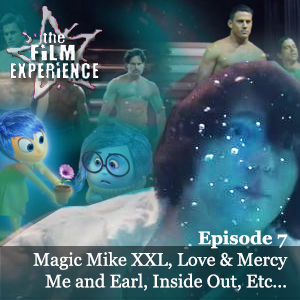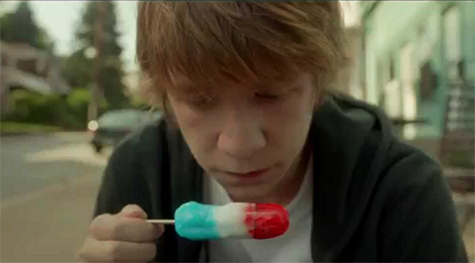Podcast XXL: Brian and Earl and the Inside Out Girl
 Sunday, July 5, 2015 at 8:00PM
Sunday, July 5, 2015 at 8:00PM 
Nathaniel R is thrilled to welcome Nick Davis back to the podcast. He's been binge-watching 2015 movies after months of deprivation. Seven films discussed if you count Jurassic World... but perhaps you shouldn't. We talk fast because there was just so much to catch up on.
Contents
- 00:01 Jurassic World
- 02:00 The Upcoming 1995 Smackdown
- 04:45 Magic Mike XXL and his women
- 10:37 Dope and Me and Earl and the Dying Girl: Or, The Good and Bad of Sundance Quirkiness
- 22:10 Inside Out and a little more XXL just because
- 29:24 Love & Mercy and/or 'Admirations & Misgivings' about the movie itself
- 39:00 Spy
You can listen to the podcast here at the bottom of the post or download from iTunes. Please continue the conversation in the comments because if the podcast were twice as long there'd still be plenty left to say. We repeat: seven movies.

Further (Related) Reading:
1995 Smackdown Info, Nathaniel on Magic Mike XXL, Nick on Magic Mike XXL, Rose Byrne FYC, and Nick's "Fifties" Report for 2015



Reader Comments (15)
Terrific podcast, guys
I wish you guys had talked more about Inside Out (since the most specifically Nat has talked about it up to now, and I'd love to hear more about it) but about what you did say, Nick, while I get you not loving the idea of Riley's emotions and personality islands being so compartmentalized, I think that's part of the point the movie is making. When you're a child, everything has its place and everything makes sense within who you are, but once you grow up, things become more complicated. I love that this film shows the beginning of that. We know by the end of the movie that this crisis is just the first in many that will come along and Riley's personality will only be rattled more and more, but the first needed to happen was that her highly-compartmentalized childhood personality needed to be shattered. That was my take on that, and part of why I love this movie so much (iI also love that the movie talks about how important it is to feel sadness in a movie tradition that is so obsessed with "and they lived happily ever after... at least until the sequel")...
Yes, it was impressive that you guys were able to cover so much in such little time. I like this format better, with one guest only. It would be interesting if they could alternate individually.
It was illuminating to listen to your comments about Inside Out because it kind of reflected my feeling for the movie, but it was beautifully articulated by Nathaniel, which goes to show how impressively varied in its effect on people the movie is. Each person really does have their very own experience with it. What I like the most about it is that the HEART is absent completely. We are conditioned in our society to have a heart as a source of feelings or a place where feelings are felt, which I believe is detrimental to the emotional development of humanity. I feel (in my brain) extremely joyful that Inside Out places feelings where they belong, in the brain.
Aw, Nick you don't like The Beach Boys? You're forgiven. But treat yourself to Smiley Smile and Sunflower if you still had some feelings about Pet Sounds.
Love everything about the Magic Mike review, you're both completely wrong about Me and Earl... (except for the great scene, and I'd watch the embarrassing fake movies!) and you underrated Dope, but let's be honest, I'd happily hear you guys chat about any movie. No love for the surprisingly strong ending in Dope though? But "Mommy, what is depression?" =<3 And the actressy dedication to Elizabeth Banks was lovely - what a summer for her, also being one of the few female directors to bring us a #1 film (even if the film was just OK).
So glad to hear others who were underwhelmed about Me and Earl... I really wanted to like it and there was some good stuff in there but there were too many big flaws. The biggest flaw being the way the girl was just a walking disease to teach the boy a life lesson.
But I do disagree with you guys that Earl can't be both into boobs and see a girl as a human being. Straight boys! They're complicated! It's kind of like how gay men can be into seeing movies about male strippers but still see those strippers as real human beings. ;)
Oh, Nat, can I also make a suggestion? The breakdown to the minute you include in this post about when you start talking about each movie? Could you include that in the podcast notes so when we listen to it on our phones we have that handy? Some of us don't come to the blog post to listen to it.
@Richter: I totally agree that my misgivings about Inside Out amount in many ways to being unpersuaded by the movie's whole project. It certainly has the courage of its conception; I just didn't respond fully to the conception on its own terms, and thought it stuck the film within somewhat flat spatial logics (point A, point B, etc.) rather than taking greater advantage of all the formal and storytelling possibilities that "headspace" might have opened up. But I think it still cleared this hurdle better than films like Inception have, and you make a great case for the movie. Thanks!
@Goodbar: Another beautiful point! Co-sign.
@CMG: I don't have actual antipathy, and I'm badly positioned to comment on their discography. I know the radio hits, and they've never moved me to listen to more, even though critics I respect have lionized Wilson for a long time. Just not my bag. But maybe it is, and I just haven't allowed myself to know!
@DJDeeJay: I see what you're saying, but I don't see any tension between Earl digging on women and their bodies vs. seeing them as people. I'm fully down with everybody being complicated, breast men included! It was the particular way the film reduced Earl's comments to one-liners about "dem titties," over and over, and questions about whether Greg had made contact with dem titties yet, and quick walk-ons just to say "titties," with no other obvious curiosity about Rachel or her story. It played to me as a pretty marked limitation in Earl's ability to imagine Rachel, and also felt part and parcel with the film's refusal to cede Earl much space or characterization, except insofar as he too is a foil for Greg's development. Garishly executed, and a tough fit with Earl's more nuanced speeches later (all in service of Greg's unearned characterization). Hope that clears up my beef, though you still may not agree.
Nick - totally agree and I mostly agree with you on the way the film handled Earl. To me, Earl's later speech felt more like the venting of a guy who is sick of his friend's bullshit and is finally saying something because maybe he could put up with his friend's self-centeredness before, but now his friend can't even get his shit together to help a girl dying of cancer.
But I fully admit this is something I'm projecting on to the character because, as you point out, the film doesn't devote much energy to him.
DJDeeDay... that's a great idea. BUT I don't know how to do it. I will try to figure it out.
arkaan -- thank u!
See, for me "Inside Out" gets away with being kind of reductive and facile in its psychological representations because it's a film about understanding intangible concepts and making them palpable. If the film had attempted to preserve abstraction it would be entirely counterproductive to its edifying goals, and kids would be even more lost with it than they are currently. In any case, I think it manages to be both basic and incredibly nuanced, and it gets at some very simple, profound truths that *are* ineffable.
I want to commend both of you for your calm dissection of Me and Earl and the Dying Girl, a film that left me in a barely-articulate rage by the end.
Well, Nick, I'm always happy to make a case for a film I love. the fact that the film has been recurring in many of my thoughts and conversations these past few weeks (including many psychologist friends, which includes my mom) is a sign that it has already had a lasting impact.
I also agree with Jonathan that the film gets away with being somewhat reductive, because as much as we may think otherwise, the target audience is still a family audience (an audience that doesn't always respond to too much nuance) and the fact that the film takes a lot of chances that most mainstream family films wouldn't even dream of (including, like I said, making it a film about embracing sadness as a necessary emotion in a culture obsessed with happiness) is something worth celebrating, while still recognizing that the film has a target audience in mind.
@Robert: It would have been impossible right after the film was over. I promise you I felt the same.